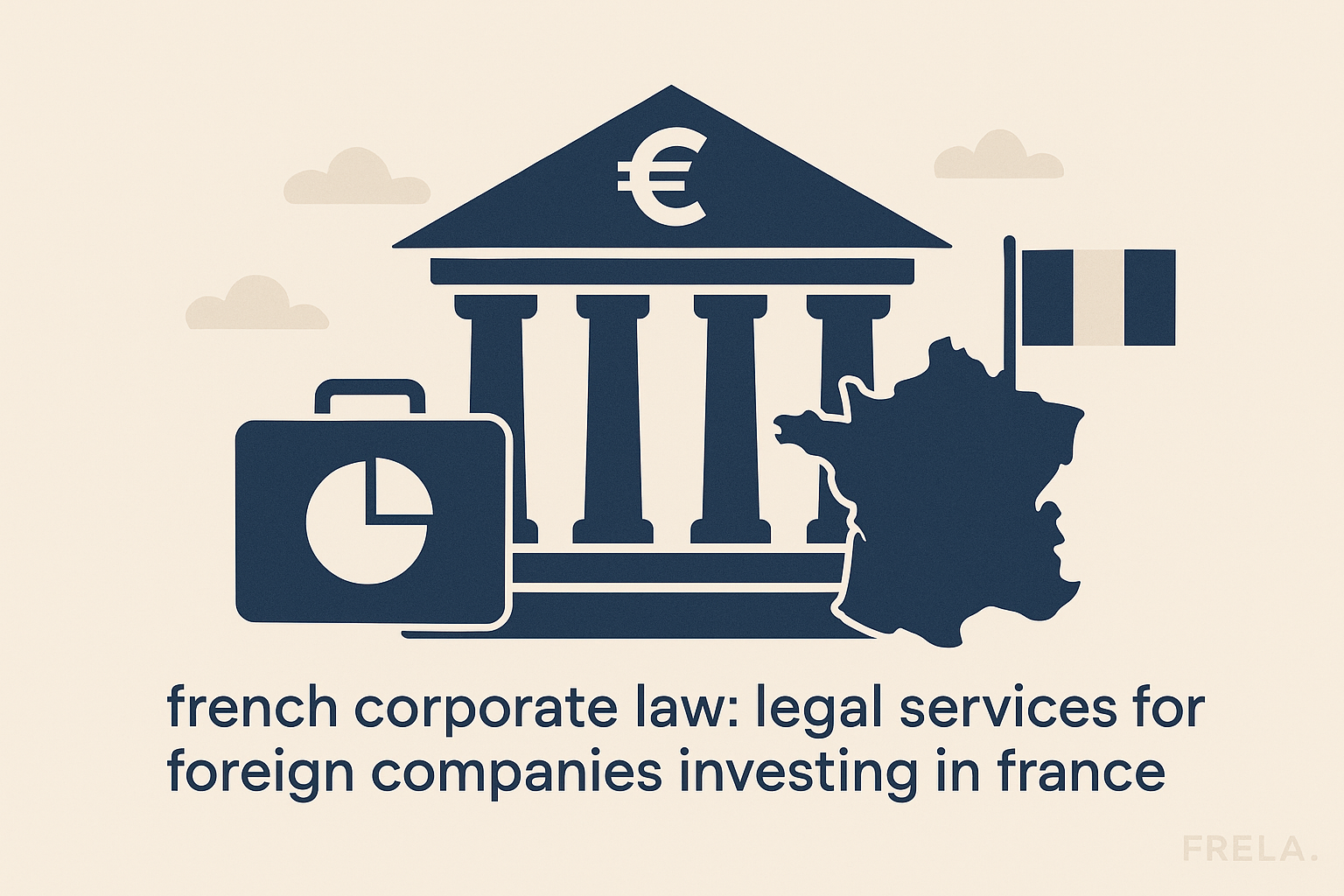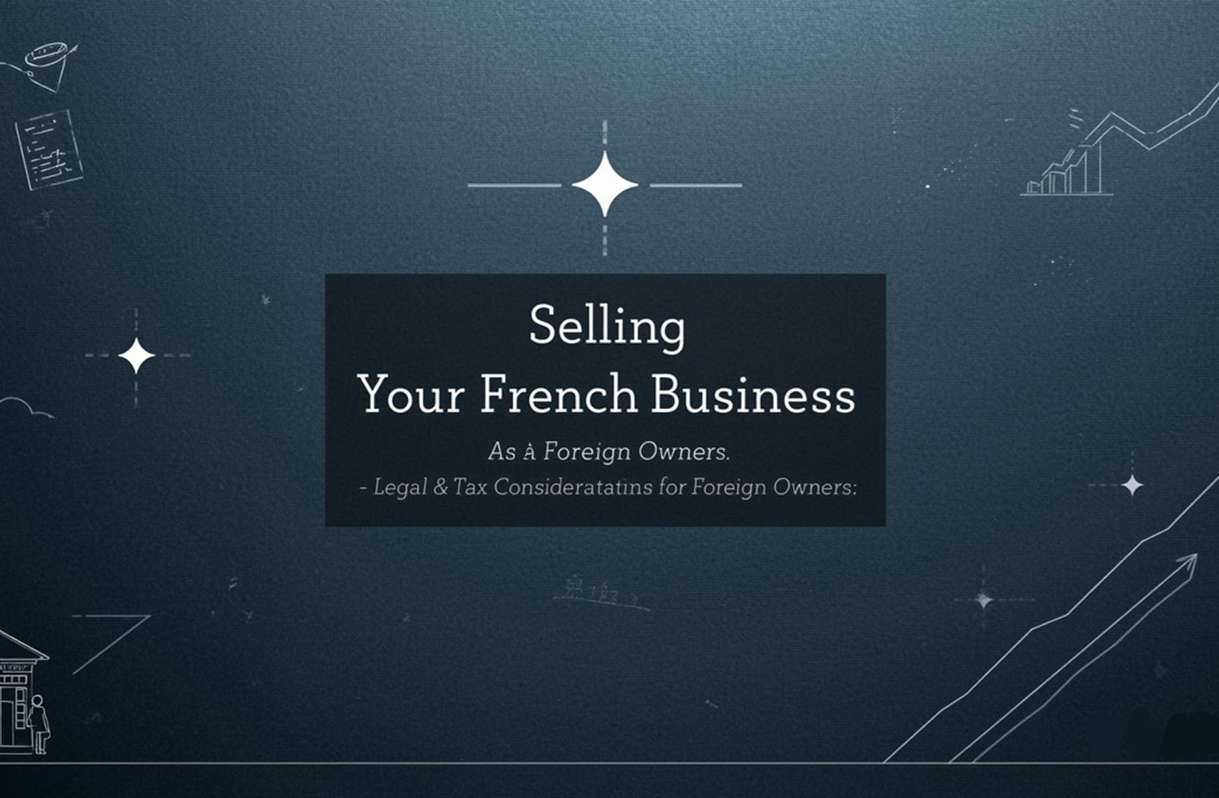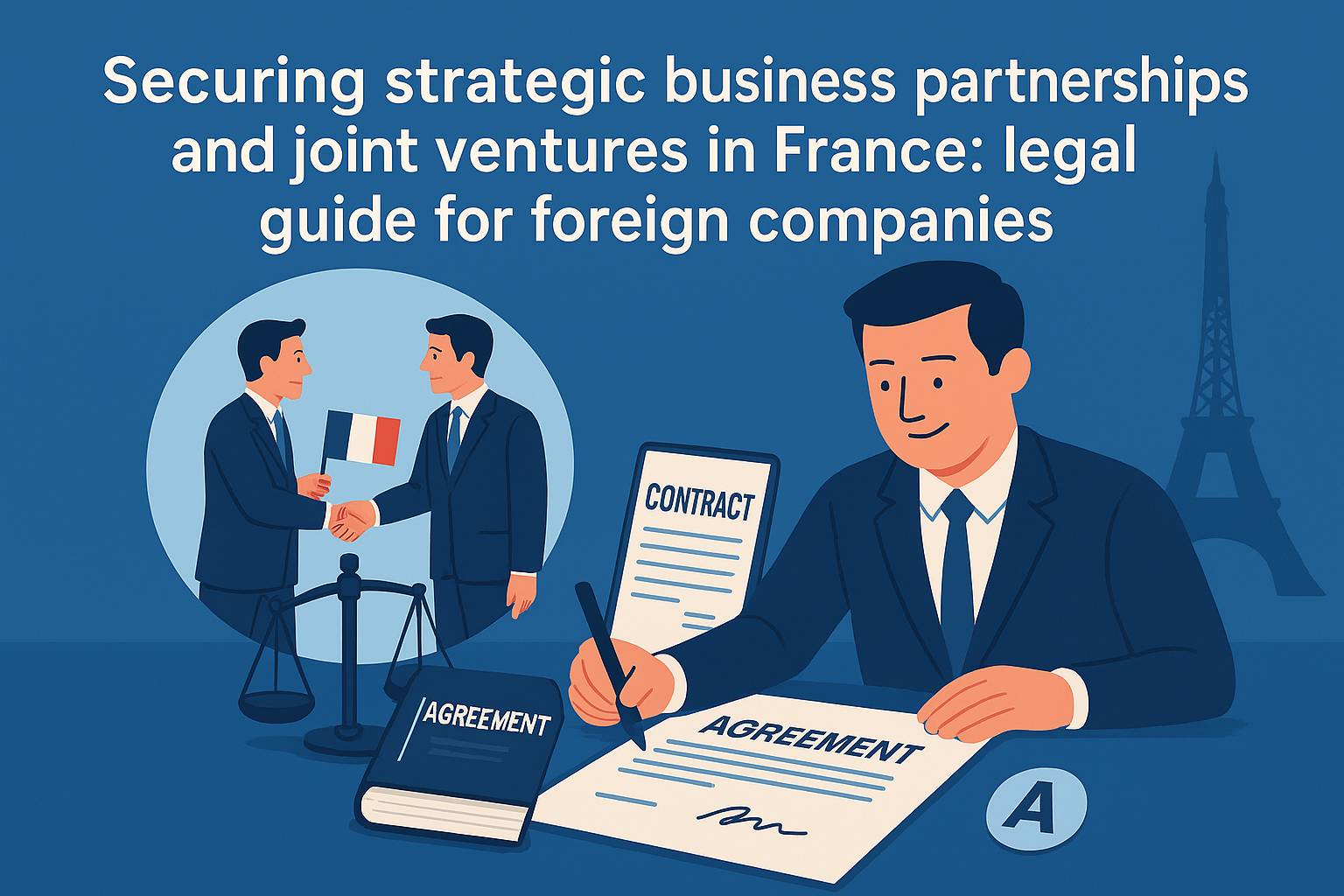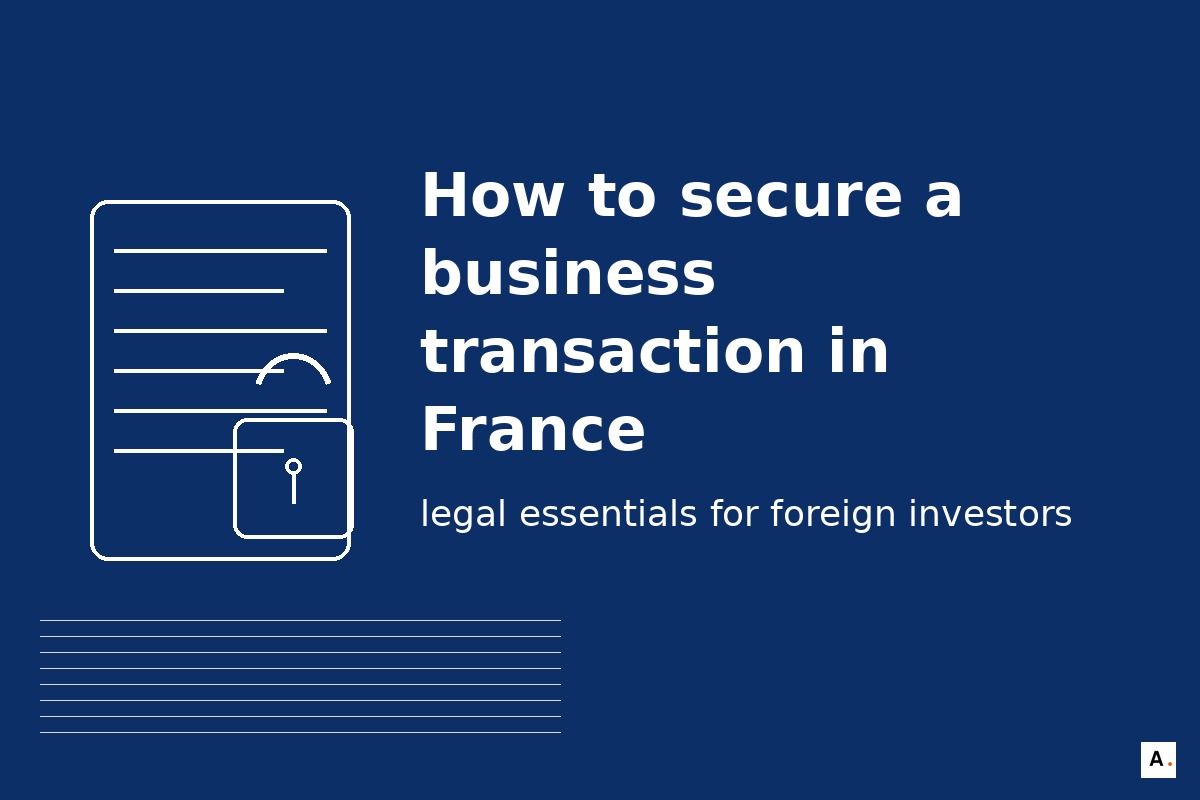French corporate law: legal services for foreign companies investing in France
Overview of the French Corporate Legal Framework
France is a civil law jurisdiction with a codified system of business laws. The primary sources are the French Commercial Code (Code de commerce) and Civil Code, which govern the formation and operation of companies, along with related codes such as the Monetary and Financial Code for investment regulations. French corporate legislation is heavily codified, ensuring that rules are accessible and predictable. In addition, European Union directives and regulations on corporate governance influence French law, harmonizing certain company law aspects across Europe. For foreign investors, this means the legal framework is structured and transparent, albeit complex.
Notably, France allows full foreign ownership of businesses. There are no general citizenship or residency restrictions on who may incorporate or own a French company. A foreign individual or entity can own 100% of a French company’s shares, whether it’s a private limited company or a publicly traded company. Moreover, the company’s legal representative (e.g. CEO or manager) is not required by law to reside in France, which is a significant advantage for foreign entrepreneurs. (However, practical considerations such as having a local representative for labor matters or an address for service are advisable.)
France’s courts and institutions support a robust business environment. Commercial courts handle disputes related to companies and transactions, and their decisions help interpret the codes. Overall, foreign investors will find a stable legal environment underpinned by clear statutes and EU-wide standards. The key is to understand the types of business entities available and the procedures to establish and run a company in compliance with French law.


Choosing the Right Business Structure in France
One of the first legal steps for a foreign company investing in France is choosing an appropriate business structure. French law provides several types of corporate entities, each with distinct features governed by the Commercial Code. The most common company forms are: the Société à Responsabilité Limitée (SARL), the Société par Actions Simplifiée (SAS), and the Société Anonyme (SA). These roughly correspond to, respectively, a limited liability company, a simplified joint-stock company, and a public corporation.
- SARL (Limited Liability Company): A SARL can have from 1 (as an EURL for single-owner) up to 100 shareholders. It has no minimum capital requirement (a token capital of €1 is possible). Shareholders’ liability is limited to their contributions. SARLs are managed by one or more gérants (managers) who must be individuals. This structure has relatively rigid rules but is popular for small and medium businesses in France due to its simplicity. Notably, a SARL’s shares (called parts sociales) are not freely transferable – transfers to third parties often require approval by existing shareholders representing at least 50% of shares. Foreign investors use SARLs for smaller-scale ventures, though the form can become less suitable as a business grows.
- SAS (Simplified Joint-Stock Company): The SAS is widely regarded as the most flexible and foreigner-friendly entity. It can be formed by a single shareholder (as an SASU) or multiple shareholders with no upper limit. There is no minimum capital (again, €1 is technically sufficient). The SAS is managed by a president (who can be an individual or company) and optionally other officers, with great freedom to organize governance in the bylaws. Shareholders can design decision-making rules, veto rights, and transfer restrictions as they see fit. Importantly for foreign investors, the SAS is often the preferred vehicle for joint ventures and wholly-owned subsidiaries due to its flexibility. Unlike an SA, an SAS can be 100% owned by one entity and is not required to have a board of directors. It cannot issue publicly traded shares, suiting it to private companies. For example, many international firms set up a French SAS as their operating subsidiary because it resembles Anglo-American corporate forms and allows tailoring of governance to the investor’s needs.
- SA (Public Company): The SA is a more formal joint-stock company designed for larger enterprises. It requires a minimum share capital of €37,000 (with at least 50% paid in at incorporation). An SA must have a board of directors (with 3 to 18 members) or a dual structure with a management board and a supervisory board. At least two shareholders are required (seven if the company is publicly listed). SAs can offer shares to the public and get listed on stock exchanges, unlike SAS. However, the SA has more rigid legal rules (e.g. mandatory annual audit regardless of size, stricter quorum and majority requirements for shareholder meetings) and is generally less flexible than an SAS. Unless a foreign investor’s ambition is to create a large company with many investors or eventually go public, the SAS tends to be preferred over the SA for privately-held ventures in France.
Other forms exist (such as the SC – société civile, a civil company used for non-commercial purposes, or partnerships like the SNC – société en nom collectif, where partners have unlimited liability). Such forms are rarely chosen by foreign investors except for special cases. In practice, most foreign companies choose between the SARL and SAS, with the SAS increasingly dominant for new investments. The simplicity of having one shareholder and minimal capital, combined with limited liability and contractual freedom, makes the SAS highly attractive to international businesses.
It’s worth noting that French law (Article 1832 of the Civil Code) defines a company fundamentally as a contract whereby two or more persons agree to contribute to a common enterprise and share its profits (or losses). In certain cases, even a single person can form a company (as with SASU or EURL). This contractual foundation means that once you choose a form like SAS or SARL, the relationships among stakeholders will be governed both by mandatory provisions of law and the company’s bylaws (statutes). Crafting those bylaws carefully – especially for an SAS, which allows creative arrangements – is a critical part of setting up the business.
Incorporation Procedures and Requirements
Setting up a French company involves several legal formalities, but the process has been modernized in recent years. All companies must register with the Registre du Commerce et des Sociétés (RCS) to obtain legal existence and a company number (SIREN). Since January 2023, France launched a “one-stop” online portal for business registration (the Guichet Unique on the INPI website), streamlining the process. This means foreign investors can handle incorporation filings electronically, making it easier than before.
The typical steps to incorporate include: drafting the company’s bylaws, having them signed by the shareholder(s); appointing the company officers (e.g. the SAS President or SARL gérant) in the bylaws or by separate decisions; depositing the initial share capital in a bank account and obtaining a certificate of deposit; and filing a complete registration dossier (including identification of shareholders, addresses, the bank certificate, etc.) with the commercial court clerk. A notice of incorporation must also be published in an official legal announcements journal (this publication requirement is now often handled through the online system). Once the clerk processes the application, the company is issued a Kbis extract (a certificate of incorporation) and is formally established.
Foreign investors should be aware of a practical hurdle: opening a French bank account for the capital deposit can be challenging for non-residents. Due to strict anti-money-laundering (AML) regulations, banks may require various documents and verifications of the foreign company or individual before accepting the deposit of share capital. It is advisable to plan for this step early, and if difficulties arise, one may use a notary or specialized service to hold the funds in escrow for incorporation.
Once incorporated, a French company must fulfill ongoing obligations such as maintaining accounts, annual filings, and corporate governance meetings. Financial statements typically must be filed annually with the registry (for most companies, abridged accounts can be filed to maintain some confidentiality). Corporate law also mandates proper record-keeping of minutes of shareholder and board decisions. These compliance steps are generally straightforward but must be done to keep the company in good standing.
It is also important to note that pre-incorporation acts (entering contracts on behalf of a company before it exists) can expose founders to personal liability. French law permits a company, after it comes into existence, to adopt pre-incorporation contracts; if it does not, the individuals who signed them are personally on the hook. Therefore, foreign investors should finalize critical agreements after the company is legally formed, or include proper clauses making them effective upon incorporation.
Foreign Investment Regulations and Approvals
France prides itself on being open to foreign investment – as noted, foreign investors can own local businesses outright with no general restriction. However, there are specific regulations for foreign direct investment (FDI) in certain strategic sectors. Both French law and EU law establish frameworks to protect national security and public order in the context of foreign investments.
Under the French Monetary and Financial Code, the government may require prior authorization for investments by non-French or non-EU entities in defined sensitive industries. Article L.151-3 of the Monetary and Financial Code provides that foreign investments that may affect public order, public security, or national defense interests – such as those involving defense, weapons, vital infrastructure, or certain emerging technologies – are subject to screening. In practical terms, if a foreign investor (for instance, a non-EU company) intends to acquire control of a French company or business unit in a strategic sector, they must file a request with the French Treasury (Ministry of Economy) and obtain approval before closing the deal. The list of strategic sectors is broad – it includes defense and cybersecurity, energy, transport, water, telecoms, and technologies like AI or semiconductors as defined in regulations. The threshold for what constitutes a triggering investment can be acquiring more than 25% of the shares or voting rights by a non-EU investor, or any level of “control” as defined by law.
For example, if a U.S. company wants to purchase 30% of a French biotech firm working on vaccines, prior authorization is required because healthcare biotechnology can be deemed strategic and the 25% threshold would be crossed. On the other hand, if a German company (EU investor) acquires a French firm, EU rules on free movement of capital apply and the French authorities generally cannot block the investment except under the same national security criteria applied to all (the EU investor is largely treated like a domestic investor, thanks to EU law).
The general principle is that foreign investments are free except in regulated areas. Over the last few years, France has actually reinforced its FDI screening mechanism (especially in response to global developments) to cover additional sectors (like medical devices or food security) and to lower thresholds for review in some cases. Non-compliance with the approval requirement can carry heavy consequences: if an investment is completed without authorization, the authorities can impose fines up to twice the investment’s value and even unwind the transaction. Therefore, foreign investors should always verify whether their planned acquisition or partnership falls within the scope of FDI control. Early consultation with legal counsel and potentially the French Treasury is advised for deals in sensitive fields.
Aside from FDI rules, foreign investors should also consider EU-level regulations. The EU has established a cooperation mechanism for FDI screening among Member States (Regulation (EU) 2019/452), which doesn’t replace national laws but coordinates them. In practice, if you notify a transaction in France, other EU countries and the European Commission can weigh in, though the decision remains France’s. This mostly matters for large multinational deals.
In non-sensitive sectors, investing in France is straightforward. No general government approval is needed to start a company or acquire shares of a French company outside the regulated sectors. France also offers a welcoming regime to foreign strategic buyers in key industries (often providing support through its investment promotion agencies).
One more point: large acquisitions may trigger merger control review by the French Competition Authority or European Commission if turnover thresholds are met, irrespective of the investor’s nationality. This is not about foreign vs local, but about maintaining competition. For instance, if a foreign company buys a major French competitor, they may need antitrust clearance. This is a separate process from FDI approval and should be factored into the transaction timeline.
Corporate Governance and Employment Considerations
A foreign investor operating in France will need to navigate French corporate governance rules and labor law as part of legal compliance. French corporate law imposes certain governance requirements depending on the entity type. For a SAS, governance is largely contractual – the bylaws can create any structure of decision-making, as long as a President is named as the legal representative. For an SA, there are more prescriptive rules (e.g. regular board meetings, audit committee for large SA, etc.). All companies must at minimum have an annual shareholders’ meeting to approve accounts.
French law also emphasizes employee rights in corporate changes. Notably, companies with 50 or more employees must have a worker representative body (Social and Economic Committee, CSE) which has consultation rights on major transactions. If a foreign company invests in or acquires a French company of that size, it will need to inform/consult the CSE before finalizing certain decisions (like restructuring plans). Even in smaller companies, since 2014 there has been a rule (the so-called Hamon Law, amended by subsequent reforms) requiring that in companies under 250 employees, the employees must be informed in advance of an owner’s plan to sell the business. The purpose is to allow employees to potentially make a purchase offer. The law now provides that this information should be given at least 2 months before the sale closing. While failing to inform employees does not nullify the sale, it can lead to damages of up to 2% of the sale price against the seller. A foreign investor acquiring a French business will want to ensure the seller complied with this requirement to avoid post-sale disputes. This exemplifies how French social laws intersect with transactions.
Finally, foreign companies should be aware of certain tax formalities in corporate operations. For instance, any transfer of shares in a French company must be officially registered with the French tax authority within one month (by submitting the transfer forms and paying the applicable registration duty). The registration duty on selling shares of an unlisted company is relatively low (0.1% for shares akin to stock), whereas selling a business’s assets (a fonds de commerce) incurs higher transfer taxes. These factors sometimes influence deal structuring, as discussed further below.
In summary,
French corporate law provides a solid, well-defined framework for foreign companies to invest and operate. With the right choice of entity and careful adherence to legal formalities – from incorporation to compliance and potential investment approvals – foreign investors can confidently establish a presence in France. Many complexities (language of legal documents, nuanced local practices) can be managed with the help of local legal advisors, but the key principles of limited liability, company autonomy, and protection of investments are firmly embodied in French law. France welcomes foreign business, as seen in its top ranking in recent FDI surveys, and a clear understanding of the legal landscape will enable investors to leverage this attractive environment effectively.
About the Author :
Business lawyers, bilingual, specialized in acquisition law; Benoit Lafourcade is co-founder of Delcade lawyers & solicitors and founder of FRELA; registered as agents in personal and professional real estate transactions. Member of AAMTI (main association of French lawyers and agents).
FRELA : French Real Estate Lawyer Agency, specializing in acquisition law to secure real estate and business transactions in France.
Paris, 15 rue Saussier-Leroy, Paris
Bordeaux, 24 Rue du manège, 33000 Bordeaux
Lille, 40 Theater Square, 59800 Lille

This article is provided for general information only and may not reflect the most recent legal or tax developments. It does not constitute legal advice. Please contact us for personalised guidance before making any decision.




